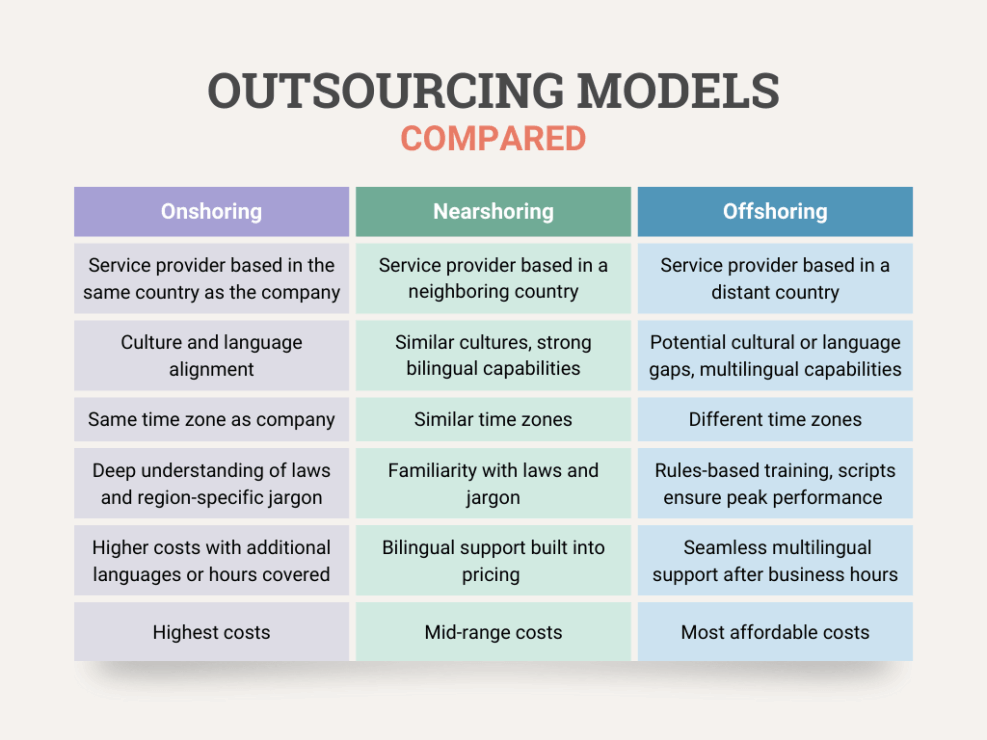Read Time: 15 minutes
What Is Offshore Outsourcing and How Can It Benefit Your Business?
Offshore outsourcing is the practice of contracting with a third-party provider to conduct business operations via agents based in an outside country. While onshore outsourcing contracts agents based in the same country as a company and nearshore outsourcing contracts agents based in a neighboring country, companies choose offshore outsourcing for reduced costs and specific language, cultural, or time zone needs. Offshore outsourcing can benefit a business by empowering them to seamlessly scale operations for maximum cost-effectiveness while accessing global expertise, advanced technology, and comprehensive customer support.
Table of Contents
Introduction
Outsourcing is a lucrative option for businesses looking to reduce costs, optimize operations, and expand service capacity. Knowing where to turn is key to an effective strategy: to source onshore, nearshore, or offshore is the question.
Learn how to make the best decision for your company in today’s blog. We’ll cover everything you need to know about offshoring, from pros and cons to services and tips on choosing the best offshore outsourcing companies for immediate and long-term success.
Key takeaways
- Offshore outsourcing is a cost-effective strategy for scaling operations and improving service capacity.
- Offshoring enables businesses to access global talent at lower costs, especially for functions like customer service, IT, finance, and back-office support.
- Offshore outsourcing models are ideal for companies needing after-hours coverage, multilingual support, and scalability without the high costs of onshore teams.
- Success in offshore outsourcing depends on selecting the right partner and proactively managing communication barriers, cultural differences, and data security concerns through language training, brand immersion, secure frameworks, and regular performance evaluations.

What is offshore outsourcing?
First, start with the basics. The purpose, history, and relevance of offshore outsourcing can help you determine its potential role in your strategy for maximum impact.
Definition of offshore outsourcing
Offshore outsourcing is when a company contracts with a third-party provider to handle operations outside of the country in which the company is headquartered. The contracted business process outsourcing (BPO) provider takes over operations, using the most current methods to streamline processes at reduced costs.
The BPO partner handles everything from recruitment to hiring, training, onboarding, and workforce management so the company can focus on core business functions. They source agents from trusted offshore locations to meet specific needs of their partner:
- Reduced costs
- More diverse language capabilities
- Targeted cultural alignment
- Specific hours of coverage needs
The distance between a company and offshore teams means significant differences in time zones, cultures, and language capabilities, but depending on the business and customer base, this can be just what they need to align workforces with audiences.
History and relevance
Say the word “outsourcing” and offshore teams often come to mind. While evolving technologies and economic and educational conditions have changed outsourcing, offshore teams continue to play a significant role in global economic development.
In the 1950s, companies initially focused outsourcing efforts on low-skilled or unskilled manufacturing jobs and simple assembly tasks. Lower labor costs, more lenient environmental regulations, less stringent labor regulations, favorable tax conditions, and proximity to raw materials made offshore outsourcing a clear solution for businesses worldwide.
By the 2000s, increased educational opportunities expanded exported work to include more skilled jobs in customer call centers, financial management, and IT. India, the Philippines, and Malaysia saw more university graduates in technology capable of managing complex tasks including software engineering, computer chip design, and code writing.
Today, offshore outsourcing works in tandem with onshore and nearshore outsourcing to provide companies with customizable solutions that combine convenience with purpose and longevity.
Offshore outsourcing examples
As customer demands grow more complex, BPO providers respond by expanding agent specialties. Outsourcing particularly suits rules-based roles and automated support. Take these examples where offshore teams thrive:
- Customer service – Transferable skills support customers of various industries. Self-service and other end-to-end customer experience (CX) strategies improve engagement and business.
- IT – Offshore experts diagnose and resolve technical issues around the clock, improving user experiences and retention.
- Finance – Offshore teams train in the work and put compliance and security first.
Want to scale your business?
Global Response has a long track record of success in outsourcing customer service and call center operations. See what our team can do for you!
Why companies use offshore outsourcing
Common business challenges overwhelm internal teams, frustrate customers, and limit scalability and success. Offshore outsourcing targets these hurdles with strategies that leave a lasting impact on operational efficiency and business success.
- Challenge: Cost savings
- Solution: Offshore outsourcing is the most affordable outsourcing model, with teams priced per agent per month or by hours worked. A variety of locations offers businesses flexibility in prices for the ideal fit.
- Result: Reduced costs and more dedicated attention engaging customers and securing revenue growth.
- Challenge: Limited specialties
- Solution: A BPO provider taps into a constantly updated talent pool, recruiting for required skills and language proficiencies.
- Result: Streamlined onboarding and training with expert teams raising service standards and continuous agent coaching ensuring constant improvement.
- Challenge: Limited service capacity
- Solution: Dedicated team sizes tailored to efficiently handling your demand volume are supported by industry-leading technology and flexible workforce management.
- Result: 24/7 customer support achieved through sufficient team sizes, scheduling to cover after-hours and overflow, and automated support via live web chat and expanded self-service.
- Challenge: Scalability
- Solution: Offshore teams scale to maximize cost-efficiency regardless of volume.
- Result: Scalable teams empower business to grow.
Benefits of offshore outsourcing
Still a key player in outsourcing, offshore teams can revolutionize business processes, driving success through dedicated support and targeted solutions. Choosing to outsource your operations offshore will bring tangible results to the performance of your team and customer experiences. Evaluate these benefits of offshore outsourcing to anticipate its effects on your business:
- Reduced operating costs and a team dedicated to your long-term success
- Improved efficiency, expanded service capacity, and higher customer satisfaction
- Business continuity through brand immersion training and elevated service standards
- Innovation and expertise targeting evolving business needs
Common offshore outsourcing services
Effective outsourcing offers specific solutions to achieve the results you seek — and possibly even some you didn’t know you needed. Expert BPOs provide comprehensive yet flexible strategies to create a custom plan for your success. Check out these common offshore outsourcing services to see what offshore teams can do for you:

IT and software development
IT offshore outsourcing saves significant resources in hiring and developing the technical support infrastructure that is vital to the health of any business.

Call centers and customer service
Offshore agents are professionally trained to manage and enhance customer experiences, with empathy training, escalation management, and customer journey mapping guiding responsive care.

Back-office processing
Securely handing off administrative tasks to offshore experts allows internal teams to focus on fulfilling their specialized tasks and enriching face-to-face interactions.

Finance and accounting
Offshore teams can handle bookkeeping, payroll, and tax preparation in compliance with local regulations.

HR and recruitment
Efficiently screen candidates, attract high-quality job seekers, conduct interviews and background checks, and manage payroll and benefits administration via HR offshore experts.

Offshore outsourcing vs. onshore vs. nearshore
The global nature of outsourcing can seem overwhelming, but the various outsourcing models organize the search. Choose among offshore, onshore, and nearshore outsourcing to find the right fit for your business. Learn about each to answer the question, “Is offshore outsourcing effective for my company?”
READ MORE: Onshore, Offshore, Nearshore: Which is Best?
Onshore outsourcing
Onshore outsourcing is when a company contracts a third-party service provider based in the same country in which they operate. Companies can expect certain features of onshore teams:
- Cultural alignment
- Language alignment
- Similar time zones
- Deep understanding of local laws, regulations, and industry- or region-specific jargon
- Higher costs
Companies should choose onshore outsourcing if their needs fit these criteria:
- Language – Customers rely on native speakers to understand or effectively engage with agents.
- Hours of operation – Company requires regular or overflow support during business hours.
- Pricing – Budget allows for onshore costs.
Nearshore outsourcing
Nearshore outsourcing is when a company contracts a service provider based in a country that neighbors their own. The closeness in geography can offer companies the best of both worlds, particularly for US-based businesses:
- Cultural similarity
- Bilingual capabilities
- Similar time zones
- Mid-range pricing
Companies should choose nearshore outsourcing if their needs fit these criteria:
- Language – Company requires bilingual agents to communicate with customers (most often English- and Spanish- speaking for US-based companies).
- Hours of operation – Company requires support during or outside of business hours at reduced costs.
- Pricing – Budget requires flexibility, particularly for additional language capabilities.
Offshore outsourcing
Offshore outsourcing is when companies hire providers based in a country outside of their own. The distance between companies and offshore outsourcing call centers affect the model in key ways:
- Potential cultural or language gaps
- Global language capabilities
- Significant time zone differences
- Potential lowered level of control
- Most affordable costs
Companies should choose offshore outsourcing if their needs fit these criteria:
- Language – Company requires English and additional language capabilities. (For example, English and Tagalog for Philippines-based teams.)
- Hours of operation – Company requires after-hours or weekend coverage at the most cost-effective prices. While other models may charge more for after-hours support, time zone differences mean offshore agents work at day rates while providing the necessary support.
- Pricing – Company seeks significant cost savings.
Tip: Remember that the right partner provides excellent service regardless of location. Accent neutralization technologies, clear scripts, continuous training, and proactive quality assurance are just some of the many strategies outsourcing experts utilize to improve comprehension and engagement with teams everywhere.

Challenges of offshore outsourcing and how to overcome them
No solution comes without its challenges. While powerful and effective, if not done well, offshore outsourcing can exacerbate or introduce the very issues you want to avoid. The right partner, however, is comfortable navigating offshore outsourcing challenges and mitigates risks with effective strategies.
Take these steps to face common offshore challenges head on to turn problems into strengths.
- Challenge: Communication barriers. Hiring purely for cost savings can lead to insufficient sourcing, with language gaps widening the divide between customers and businesses.
- Solution: Language training. Ask your potential BPO partner how they ensure proficiency in your required languages. Consider a program that offers language courses or otherwise coaches agents for the results you want.
Invest in a partner that knows the nuances in the workforces they employ. Some areas may be less proficient in your language while a subset of that community is perfectly fluent.
- Solution: Language training. Ask your potential BPO partner how they ensure proficiency in your required languages. Consider a program that offers language courses or otherwise coaches agents for the results you want.
- Challenge: Cultural differences. Some offshore teams can struggle to understand regional or industry-specific slang, causing frustration in customer interactions as customers seek more nuanced, prompt support.
- Solution: Brand immersion. Training teams in brand voice, policies, systems, products, and culture will improve their performance and commitment to your business, ensuring your agents are the extension of the brand you want them to be.
- Challenge: Data security concerns. Insufficient management, communication, or infrastructure introduce security risks that are harder to catch with the greater distance between teams. Breaches and errors put customer information and business reputation at risk, with costly corrective measures and even legal penalties leaving a lasting impact on your brand.
- Solution: A compliance-first strategy. BPO experts put the safety of your customers first, incorporating compliance in everything they do. They establish clear performance standards and strictly follow security protocols, using secure frameworks, access controls, encryption, multi-factor authentication, and audits to identify vulnerabilities and prevent escalations.
- Challenge: Hidden costs. While adding extra services and tech features might just incur extra costs, the right partner should provide flexible options to avoid excessive fees to help you achieve the cost benefits of offshore outsourcing.
- Solution: Upfront pricing. Discuss your budget, monthly fees, implementation fees, and discounts to determine cost-effectiveness of proposed offshore plans. Before you start interviewing, determine the potential costs of internal expansion and compare these quotes with nearshore and onshore costs to anticipate just how cost-efficient each model could be for your business.
Best practices for successful offshore outsourcing
Offshoring can meet and exceed your expectations with the right strategies. Ensure your offshore operations are set up for success by taking these steps to establish the guidelines of your partnership.
- Define goals and key performance indicators (KPIs). Clearly outlining what you want to achieve from offshore teams ensures your new partner implements the most effective strategies and technologies to do so. Set clear Service Level Agreements (SLAs) to regularly assess performance and adjust efforts to meet your needs.
- Choose a vendor with industry experience. BPO experts have the experience to know the best offshore teams for your audience and your business. Read case studies to evaluate their performance with businesses and goals similar to yours.
- Establish strong communication protocols. Proper fit requires clear expectations not only for performance but also for management and communication styles. Communicate regularly and in the appropriate channels to resolve issues and provide feedback.
- Use the right tools and technology. Advanced technology innovations can streamline processes through automated assistance and feedback and custom analytics. Set up secure frameworks and access controls and assess implementation processes and compliance protocols.
Industries that benefit most from offshore outsourcing
Certain industries are perfect for offshore outsourcing. Offshore agents can learn rules-based functions, removing subjectivity or biases that can introduce errors in other tasks. For that reason, these industries thrive in offshore outsourcing solutions.
- Healthcare
- eCommerce and retail
- Software as a Service (SaaS) and technology
- Banking and finance
- Insurance
Global agents are regularly trained in customer support standards that elevate service quality across industries. They seamlessly apply these skills to industry-specific purposes for comprehensive care, enriching experiences throughout the customer journey.
How to choose the right offshore outsourcing partner
Outsourcing is about more than simply filling seats or answering phones. Set your company up for success by choosing an offshore outsourcing provider that exhibits true partnership and dedication to your business. Find the best fit for your company by evaluating these features in the providers that come up in your search.
Vendor evaluation checklist
First, start listing out what you want from an offshoring partner. Be sure to include these must-haves in your list:
- Sufficient language needs
- 24/7 support or targeted scheduling for after-hours or overflow support
- Cultural alignment
- Dedicated to long-term success
- Compliance-first operations
- Smooth technology integrations
- Continuous training
- Trains for soft skills, compliance, and product knowledge
- Omnichannel interaction handling
- Regularly evaluates performance and adjusts strategies
- Interprets data for informed decision making
- End-to-end CX enrichment
- Customizable analytics and reporting
- Flexible pricing

Download our Offshore BPO Vendor Evaluation Checklist now to help evaluate which BPO partner to choose.
Questions to ask potential partners
Once you’ve made note of which services potential providers offer, a call or interview is the next step to gauging proper fit. Ask these questions not only to determine which items they check off of your list (and how), but also to get a feel for how they operate and view the partnership.
- Is offshore outsourcing effective for my company?
- How do you address common offshore challenges?
- How would you scale to grow with my business?
- What do your omnichannel support offerings look like?
- What are your QA processes?
- How do you utilize offshore teams to achieve specific results?
- How do you align offshore agents with my culture?
- Are you compliant with PCI, SOC 2, HIPAA, and GDPR?
- What security measures do you have in place?
- Describe the recruitment process and expected timeframes.
- What daily, weekly, and monthly reports do you provide?
- Describe your communication style and issue resolution processes.
Red flags to avoid
Knowing what you don’t want in a partner will help you sift through your options and feel confident in your ultimate decision. The wrong provider can create chaos in your processes, causing you to lose out on valuable opportunities for growth or revenue generation. Steer clear of these red flags to narrow your search to the best possible match:
- Lack of transparency – about processes, security, or experience
- Poor communication – avoiding or delaying discussions of issues or concerns
- Inconsistent performance – missed deadlines or difficulty meeting SLAs
- High attrition – lost knowledge, more resources spent replacing staff and less focus on customers
- Limited vision – a lack of commitment or passion for your business stops success in its tracks
Final thoughts
Offshore outsourcing is a powerful solution for companies looking to scale operations at reduced costs. While distance can present common security, cultural, and comprehension challenges, experienced offshore outsourcing providers target these concerns with methods proven to turn them into successes.
Offshoring connects businesses with global expertise, multilingual agents, and custom solutions that improve service quality and capacity. Evaluate the common offshore outsourcing pros and cons to determine if it’s right for you.
Then schedule a meeting with an expert offshore outsourcing provider to leverage the power of a dedicated team built for your goals.
Offshore Outsourcing FAQs
An example of offshore outsourcing is when a US-based company hires teams in the Philippines for their English and Tagalog language capabilities for handling customer support interactions outside of the company’s regular business hours.
Yes, offshore outsourcing is cost-effective for small businesses! Offshore is the least-expensive option out of the outsourcing models. If a small business has the support demand to hire 3 to 5 agents, offshore outsourcing is highly effective for streamlining processes and improving support capacity.
Risks of offshore outsourcing include limited control over remote teams, security and compliance risks, time zone differences, and language or cultural gaps. Offshore experts mitigate these risks through clear protocols, continuous training, secure frameworks, quality assurance measures, and targeted workforce management.
Offshore outsourcing is when a company hires a service provider based in a country different from their own. Nearshore outsourcing hires teams based in neighboring countries to a company. Offshore teams have significant time zone, language, and cultural differences while nearshore ones align more closely in time zones, language capabilities, and cultural similarity. Nearshore outsourcing prices are mid-range while offshore prices are more affordable.
The Philippines, Tunisia, and South Africa are some of the top offshore outsourcing countries.
Offshore outsourcing is ideal for businesses seeking cost reduction, global expertise, after-hours and weekend support, or specific language capabilities.




